Partnership Fundamentals
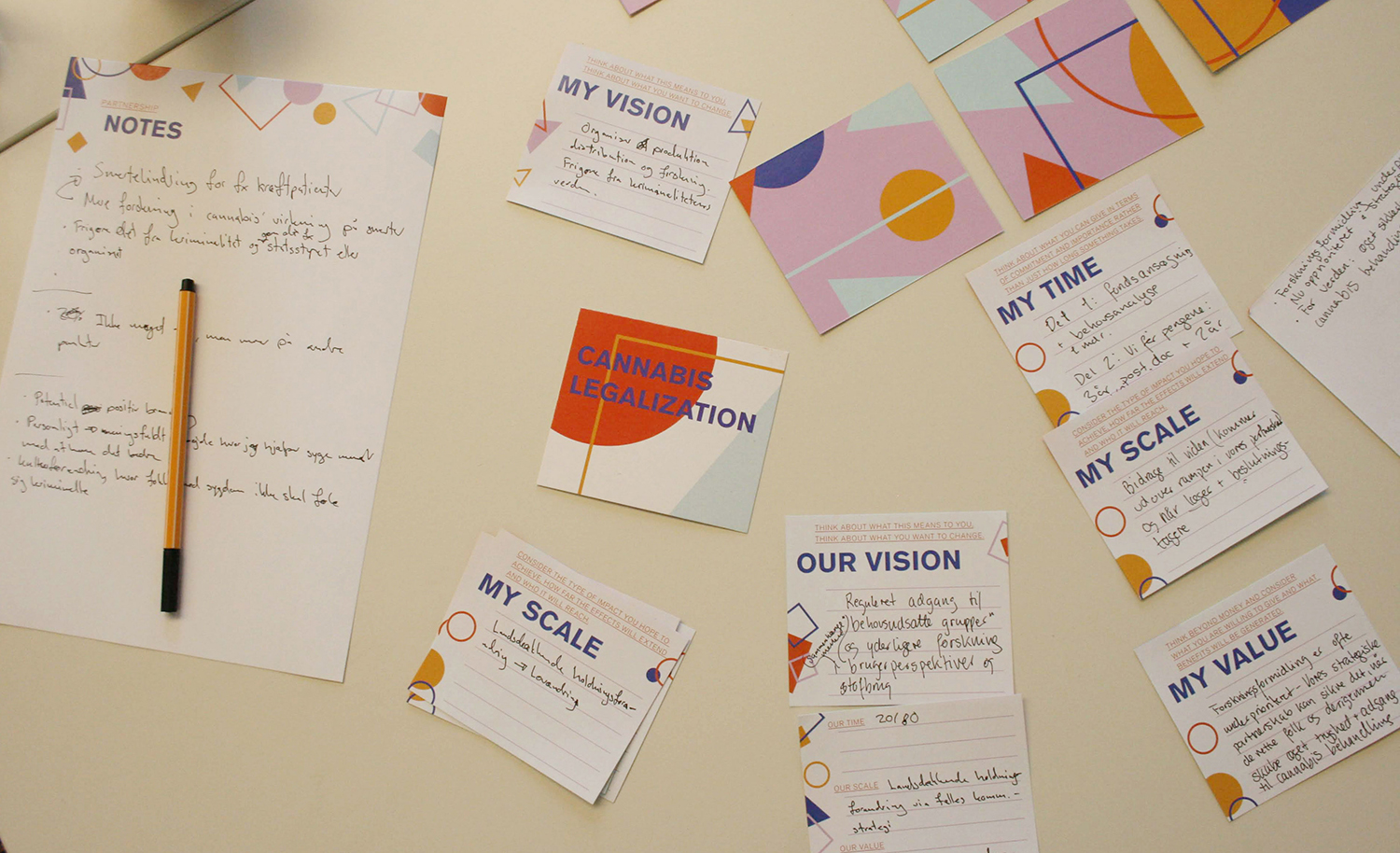



💭 Project Description
Developed in response to the UN SDG #17 (Partnerships for the Goals) the DoUC Partnership Framework gives structure to how relationships can be initiated and developed to be more effective, open and stronger. This workshop focuses on the early stages of the process, using a series of conversational exercises to encourage participants to evaluate the way they think about agreements and expectations when creating new business partnerships. Using big, common (and potentially divisive) topics that most people have ready opinions about, participants worked through what true agreement means and created the basis for shared vision and values.
The project team included: Christopher Pandolfi, Mie Bjerre Wester, and Melanie Kapogines.
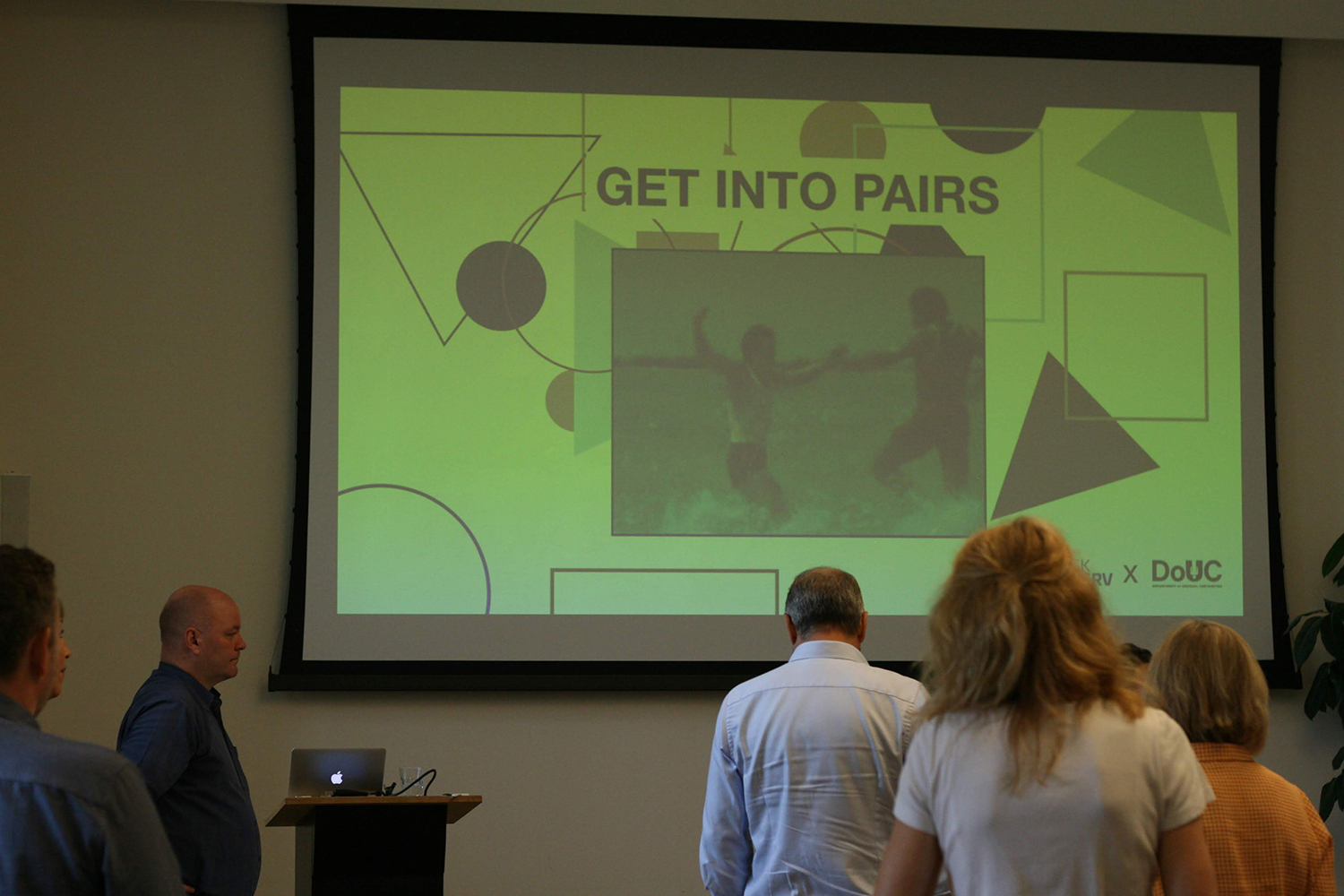
To commemorate DoUC’s 10 year anniversary, we have organized an interview series highlighting past DoUC projects.
We wanted to take this milestone opportunity to revisit projects in a fun and reflective way, calling on the perspectives of both past and present DoUC team members. Shifting from objective and brief project descriptions, we revisited our work with a renewed intimacy. With more personality. We hope this series provides deeper insight and understanding to past projects. Or, is simply a fun read!
To help you navigate this series, we recommend first reading the project summary for context. Then, you can explore the interview dialogue. Enjoy! 🙃
ℹ️ The Partnership Fundamentals interview was conducted with Chris Pandolfi (CP), Mie Bjerre Wester (MBW), and Mel Kapogines (MK).
What inspired the creation of this workshop?
MBW ⤳ In Denmark there’s this professor, Steen Hildebrandt, with the Copenhagen Business School who’s been very much, I guess, sort of a grandfather, sort of a teacher, to business communities and also about the SDGs (Sustainable Development Goals). He’s been advocating for sustainable business for a number of years and when the SDGs first came out he was very very quick to understand what they were about and find ways to talk to people about them. And, he had this saying that in in his opinion goal #17 about the new types of partnerships (“strengthen the means of implementation and revitalize the global partnership for sustainable development”) is like a key to reaching the other goals. So, in his opinion this is one of the top and sort of the toughest goals to crack— this is actually something that people should focus a lot more on and figure out how to collaborate with each other in new ways. Specifically he explains it as how we’re very used to the kinds of partnerships where we have transactions, where you give me goods and I give you money— whatever, something like that, but what we need to do in order to reach the SDGs is to find ways to participate in transformative partnerships. That has to do with figuring out how we can align our interests, share values and work towards a common goal. Instead of just thinking about how we can, you know, fulfill transactions between your business and mine.
So, that’s just been super inspiring and I think it both relates to conversations we’ve had with a number of different clients but it also really relates to our own business. We kind of recognize that struggle happening when we hire such contractors or when we’re hired for a client, and the usual way we work it into a partnership is to fight the simple transactions to build more meaningful relationships.
MK ⤳ We had been working on ideas for addressing SDG #17 and what the entire lifecycle of a solid professional partnership might look like. A previous project (Disagreement as Agreement) came up and seemed super relevant to incorporate a way to make people confront agreement in a deeper way when laying the groundwork for a partnership.
CP ⤳ The workshop was inspired by a few things. The first was a talk we gave at the MOCA. We were asked to talk about the idea of disagreement. As we began to prepare for the talk we understood that somehow it was getting easier and easier to disagree, but what was more interesting to maybe think about was the way people agree on things. That somehow agreeing with people seemed easy, but actually looking deeper people agree maybe on the basics and as you move forward with a group or with an individual the specifics of that agreement are often never discussed and you get to a point of a partnership that you thought you agreed with and then all of a sudden you realized it was anything but that. We wanted to try and create a process that would allow people to truly understand what they were agreeing to and how they could use that agreement to create better partnerships and in turn create collaboration that actually results in action. The idea of collaborating for collaboration sake has kind of become a buzz thing to do. We wanted to explore collaboration not as a thing to do but as an actual tool to make collaborative projects better.
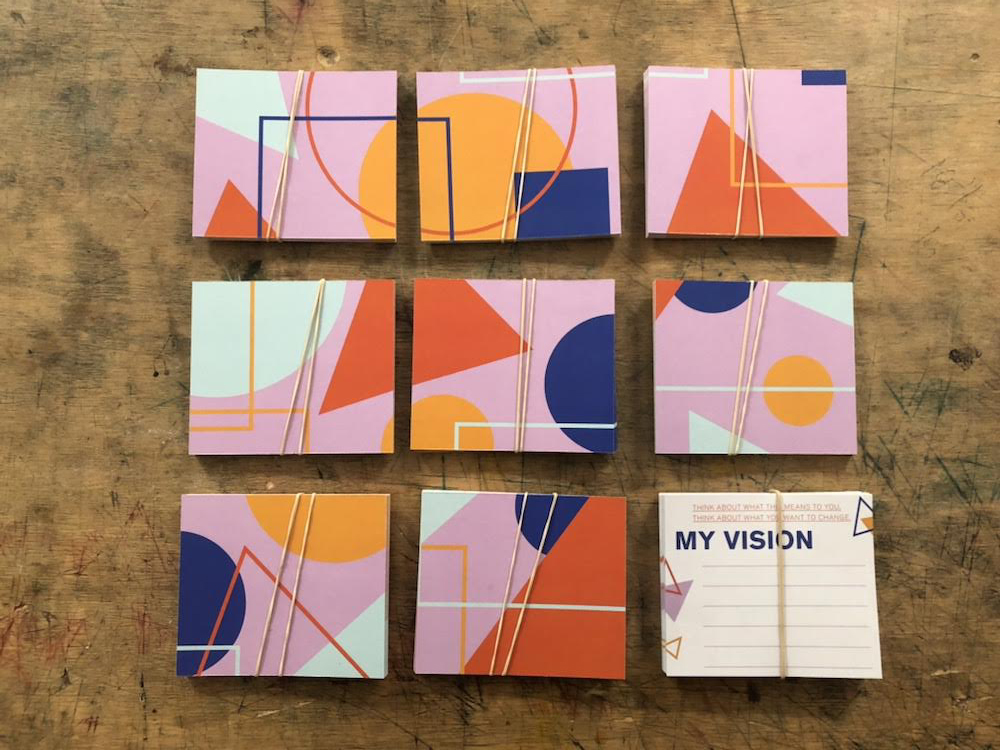
Some materials for the workshop to help guide the participants conversations
What informed this workshop? Did your own partnerships factor in?
MK ⤳ There were a lot of parallels to marriage casually drawn while we were working on it lol. That people entering any kind of serious partnership agreement should be having honest and open discussions about difficult things, and setting clear expectations for the partnership, up front even if they’re awkward. We wanted to make those conversations more structured and less awkward so people weren’t so intimidated by leading this type of conversation on their own.
MBW ⤳ My approach to this workshop was inspired by the tool Boundary Objects developed by Susan Leigh Star and James Griesemer in 1989. Boundary objects are both plastic enough to adapt to local needs and constraints of the several parties employing them, yet robust enough to maintain a common identity across sites. They are weakly structured in common use, and become strongly structured in individual-site use.
CP ⤳ We did quite a bit of research around the different partnerships we find in nature to try and understand how we could create something that was more than just the way humans classically create partnerships with each other and look at the different advantages and downfalls of these partnerships. This really helped us understand the different elements that are the core of most partnerships and allowed us to move forward to create different pathways that the workshop could take. We understood that there is no one best partnership and the workshop ended up being a way for people to explore and decide a unique partnership that would best suit all parties.
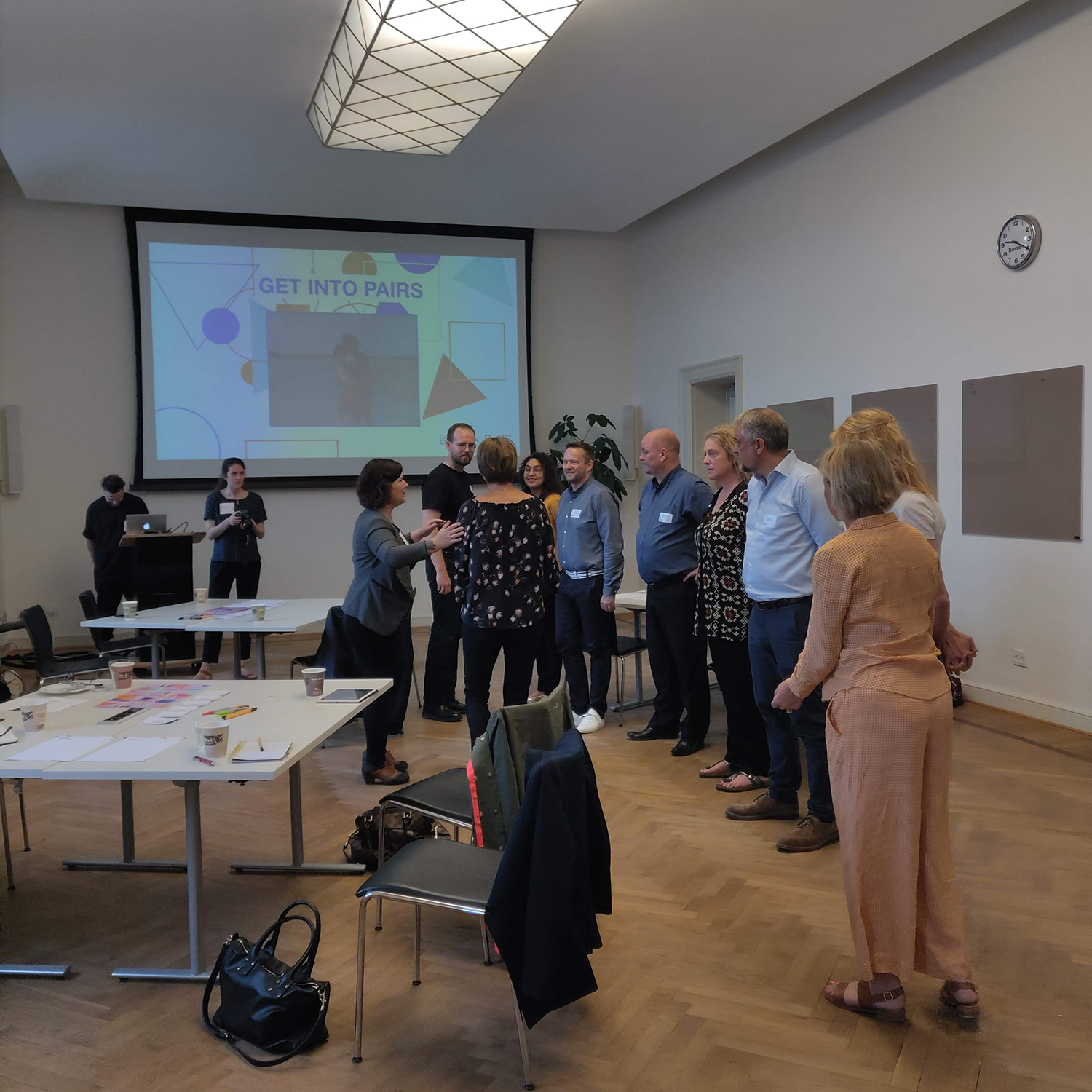
Mie pairing of the participants for conversations
Have you executed this workshop with any organizations yet? How did those go?
CP ⤳ We have! We worked with the Danish Chamber of Commerce and their members and also a human resource company. The workshops went really well, I think the way that we presented alternative versions of what time, scale and value could mean in partnership beyond their classic definition helped people think in a different way. I also feel that starting a process of partnership based around their values and how those values may conflict moving forward was another valuable insight for the participants (LOL this is also what they had said to me afterwards, so maybe that is why I am saying it).
MK ⤳ We held a workshop with the Danish Chamber of Commerce in Copenhagen and ran a group of their members (mainly small business owners I believe) through the activities. It was really interesting to see how focused and almost intimate some people got with their conversations, and to hear them express afterwards how difficult it was to find true agreement on such seemingly agreeable topics.
MBW ⤳ We worked with two different organizations and hosted workshops with them— the Danish Chamber of Commerce and they invited a number of their members to come join, and the other one was a Danish recruitment agency and they invited their clients in for this workshop as well. In both occasions they were more like training sessions and they were actually building real partnerships. So we were training or teaching the framework to give people inspiration to reconsider the way that they think of their own partnerships.
The people really did have new experiences in figuring out what is really important when you try to find somebody to work with. Well, we all know that when you try to find somebody to work with it’s purpose is focused very much on what to put in the contract, what kind of things you need to deliver to me, at what time, what is the timeline for that, how much should I pay you over there, etc. We can get very focused on the actual thing that needs to be the content of the transaction, but even though we try to be super specific it’s still very likely that we’ll disagree at some point. So the idea of this framework is that you’ll be much less likely to disagree if we actually start out by agreeing on the purpose of what we’re doing and exploring if our values align. Then you take it from there and maybe try to be more open-minded on both sides. Also on what is a possible outcome of the collaboration!
I think that a number of the participants of the workshop have had bad experiences in the past and that’s why they were participating in the workshops— they were interested in inspiration on how to work with this in a new way. Also, what a number of these people said was what they really liked about the framework was that it sort of was a way for them to find a better way into this sort of conversation with their potential partners. Some of them said, you know I feel kind of awkward trying to discuss this with people I’m gonna work with and if that’s what we really need then this really should be like the most important thing for us to discuss, but somehow it just feels inappropriate. And, somehow having the framework, having somebody else explain, then in a way it’s like, well if I use this framework then it will be DoUC sort of saying that these are relevant for us to talk about— that kind of made it easier for them to bring up some of these subjects that if you just have to come up with the thing yourself it’s difficult.
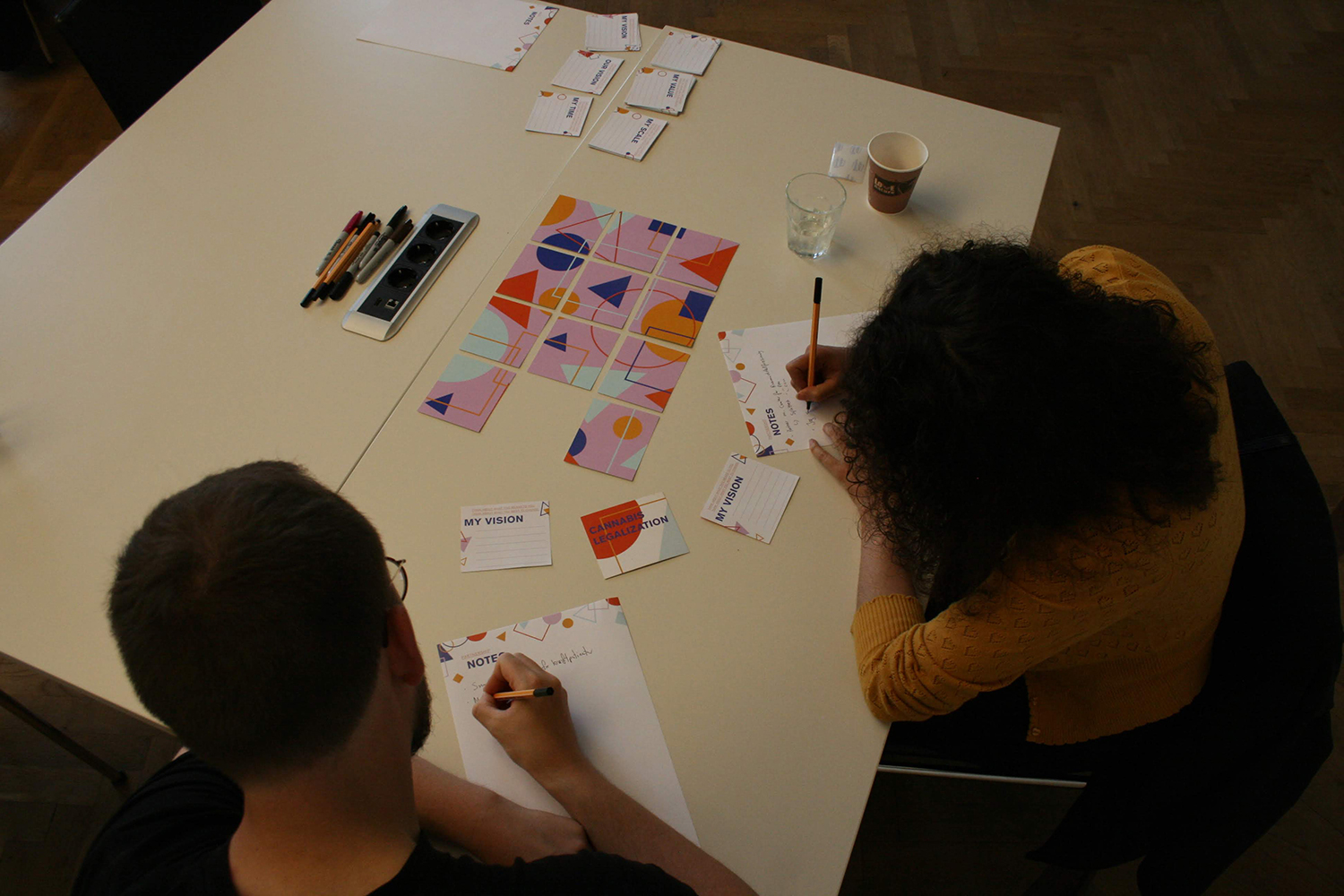
A couple of our participants discussing and notating on the topic of cannabis legalization
Can you give us some examples of the kinds of “potentially divisive” topics that you have used to catalyse conversations in the past? Why did you choose them?
MK ⤳ For the workshop in Denmark we tried to pick big, generic topics that on first glance would seem easy to agree or disagree on….Recycling, Street Festivals, Capitalism, etc
CP ⤳ I don’t think the topics were so divisive, more just a mix of banal and what I can call too big of a topic to discuss in an hour and half. For example, one of the topics participants discussed was “street festivals”. It’s funny because most people were like hey we love street festivals, but when they got into some of the details they realized maybe they did not like street festivals as much as they thought or maybe were not as committed…I mean we also asked people to discuss capitalism and also recycling…
I think we chose them because in some cases they were things that most people had an opinion on, but also maybe never thought so deeply about. In other cases they could be very polarizing and generate more discussion. The point I think was to illustrate that regardless of the scale of a topic or its perceived importance, there would always be details that needed to be understood and the scale of partnerships would look different based on the ability of the people involved and the partnered action they would want to take.
MBW ⤳ Chris chose them actually! The purpose of the training was to just have some things that were unrelated to people’s everyday work and give them a topic that nobody had a special relationship to. Then we just had them start out by figuring out what kind of shared values they might be having.
“It becomes very personal, but collaborating with people is a personal thing! So we can try to hide it and not talk about it, but whether or not our collaboration is successful depends on that.“
How did the conversations around those progress generally?
MBW ⤳ Some of the conversations were maybe more straightforward than others— we also tried out very different topics really. I remember that one of the topics was “street festivals” and that was a concrete thing for people to try to talk about and in a way the values became very clear to them. But there was something like “commercial work”, like the world is run by collective interest or something like that and what’s your vision for a “commercial world” or something like that. Well this obviously led into a political discussion but in a way that was also super interesting because that kind of also painted a picture of how values are also a very personal thing. I think maybe that’s why some people are sometimes having a hard time bringing these kinds of conversations into professional settings. It becomes very personal, but collaborating with people is a personal thing! So we can try to hide it and not talk about it, but whether or not our collaboration is successful depends on that.
MK ⤳ As soon as we got to the step where we asked people to define in more detail what their vision and values around the topic were and then share it with their partner/group, you could see there was a gap between what each person felt or had written down.
CP ⤳ Hmmm. Always very calmly and funny enough, kind of the same regardless of the scale of the topic. I mean this can change depending on audience and context.
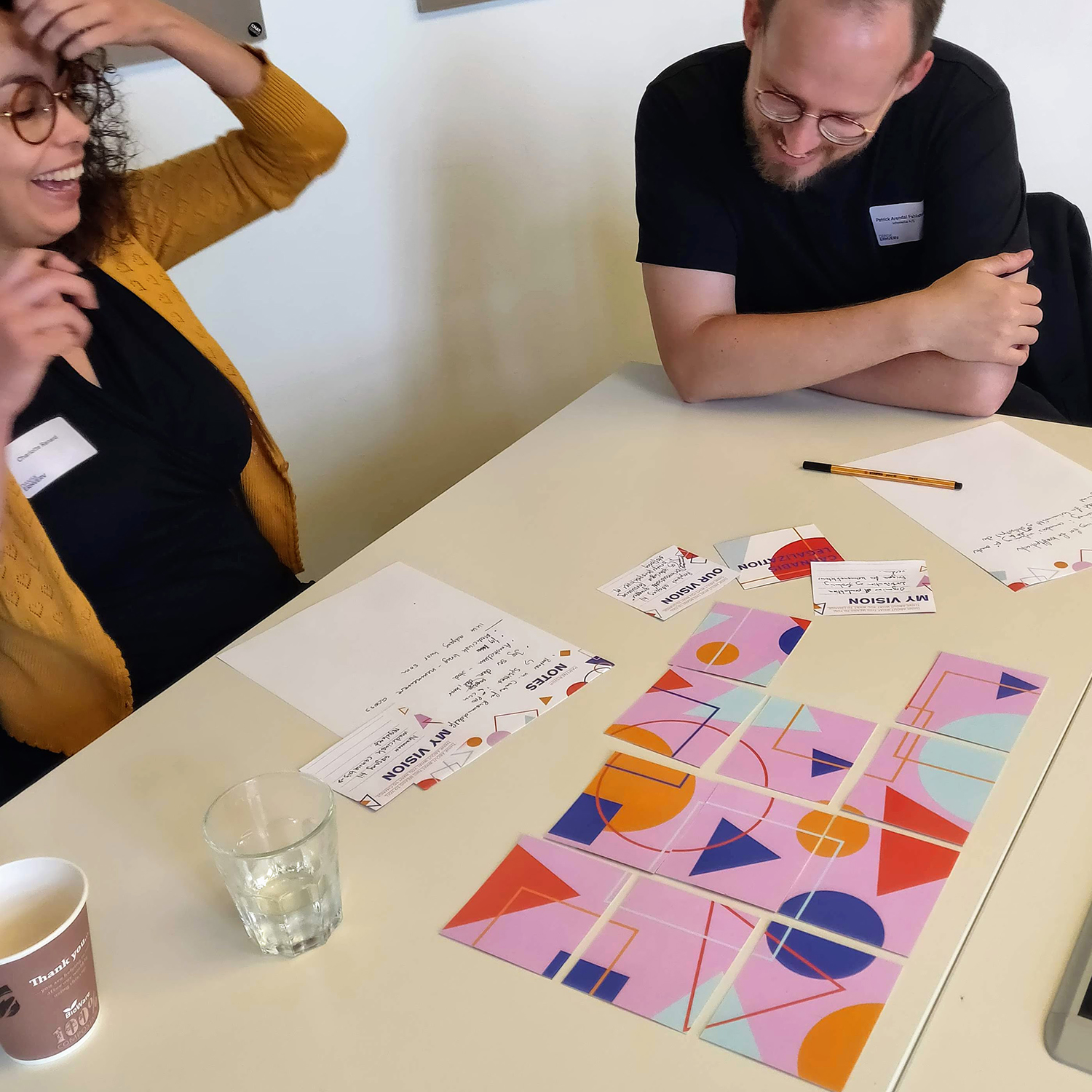
Looks like the conversation on cannabis legalization went well!
Have you found that folks actually work towards a true agreement and create a basis for a shared vision and values?
MK ⤳ Absolutely. It isn’t so much meant to be an exercise to find the exact point (which would probably end up being reduced to the lowest common denominator) where everyone can agree absolutely and perfectly, it’s meant to facilitate open discussion and find where there are common elements both people in the partnership share and can build up from. What is the partnership really founded on? Even if there isn’t perfect agreement, after having these kinds of discussions both parties know where the other stands, what they’re willing to contribute and what expectations are.
MBW ⤳ I really think that they [worked towards a sense of agreement] and I think that in real, outside training they would have to spend even more time on this because I feel like the more time they got to actually talk about this the more the whole subject just inflated really. But what definitely happened was that the groups were formed by a number of people who have never met before and in like a very short time they got to know a lot about each other. So that was a very strong sort of bridging the exercise between people.
CP ⤳ Yes I did. This will sound naive to many, but most people want to work together and build things together. When people are forced to sit across from each other, given the tools to listen and the space to reflect, most people will work towards building rather than destruction. I think the one thing that I am constantly reminded of through the work we do is that people just want a chance to understand each other and need the spaces and time to build together. Most systems deliberately stop this from happening, it is designed to create divisiveness. Designed intentionally to hold power and generate economic value. I always hope our work creates the opportunities for people to listen to each other and voice their opinions in environments that are safe and productive. I feel that this workshop is a small start to that.
Have there been any unsuccessful examples? How did you navigate those as the workshop facilitator?
MBW ⤳ No, at one of the workshops there was there was a group who always just finished super fast and then they were like oh we’re ready to the next step, and I think I tried to explore that and what kind of happened was that they kept playing nice— so they didn’t really totally buy into the premise of talking about things. They wouldn’t usually talk about it in a sort of professional sense, so they just kept everything super much on the surface. So we ended up splitting that group up and we remade the groups in order for them to get in with some people who were more forward with their conversations.
“I mean the premise of the workshop is that you are open to create a partnership…no further comment…this also goes for the Canadian government as well, especially the provincial government. I would love to have a minority government where all parties are forced to work together with different perspectives on how we can keep all of us safe.“
Would you be willing to do this workshop with the government of the United States of America?
CP ⤳ LOL…Why not and what a funny question. I mean the premise of the workshop is that you are open to create a partnership…no further comment…this also goes for the Canadian government as well, especially the provincial government. I would love to have a minority government where all parties are forced to work together with different perspectives on how we can keep all of us safe. Instead in Ontario we have a majority government that takes advice from no one but themselves…
MK ⤳ The new government or the old one?? 🙂
For the activities to work, people need to want to be there and want to build a solid partnership. You have to be willing to share. Autocrats are only in it for themselves, it would be futile.
MBW ⤳ Note: Shaili asked Mie about whether she would be willing to do this workshop with the government of Denmark instead based on their conversation about the Danish government considering introducing laws regarding forced vaccinations.
I think it would be very helpful! Well, politics really is very much about values and would be very um like meaningful and maybe even meaningful into some sort of transformation into politics sort of being less about political parties and about what kind of values and what kind of goals can we agree about in this partnership. In Denmark we have a number of different parties, which is kind of weird because they’re so much smaller than the US, but there’s basically no big parties who have all the power. So, in theory that would be like enough parties to have a number of different combinations between different types of policies sort of put together, but in reality it doesn’t really turn out that way. The parties are more extreme or less extreme and not really sort of mixing up the different issues that one would want to vote for. And, I think that maybe this approach might also be a way to focus more on the fact that it’s not about identifying yourself with a specific party or with a specific company for that matter, maybe it’s about understanding which of these issues or our goals or tasks can we actually agree about. Where are we currently at with them and how can we collaborate on them.
[Shaili: Do you think the government would be receptive to this?]
I think, well, not the government we have right now who is trying to pass laws where they can be forcing people. So I don’t really feel like that’s the way they’re going, but you know at one point they might have to. They can’t push their people too far, I guess. I don’t know that there’s a limit to what people will put up with, so I’d be way back from that!
